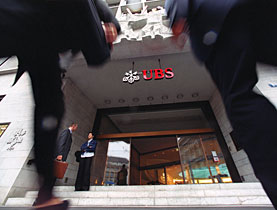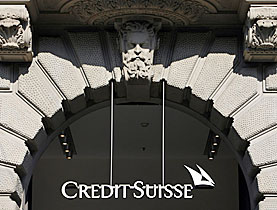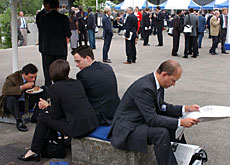State regulators warned off banking industry

Banks should not be made the scapegoats of the global financial crisis, Deutsche Bank chief Josef Ackermann has told a St Gallen symposium.
Speaking at the annual conference organised by university students, the Swiss banker blamed poor supervision of the United States housing market rather than greedy bankers for the subprime mortgage crash.
Ackermann’s comments on Thursday coincided with a public broadside from German President Horst Köhler calling for “more severe and efficient regulation”. In an interview with Stern magazine, Köhler described the financial markets as “a monster that has to be put back in its place”.
Knives have been sharpened in many quarters since the subprime crash and the consequent credit crunch severely weakened the global economy in recent months.
Ackermann acknowledged that banks must bear some of the blame for the financial crisis, but he called for self-regulation and cooperation with states rather than the imposition of rules that would “stifle innovation”.
“After decades of liberalisation, the tide has turned and re-regulation is on the agenda,” he said.
“Was it not a case of banks enjoying the good times, reaping record profits and bankers collecting multi-million dollar bonuses and then, when the going got tough, trying to avoid the dire consequences and asking tax payers to cover the losses – in short, another way of privatising gains and socialising losses? The answer is ‘No, it was not’.”
Cheap mortgages
Ackermann, an alumnus of St Gallen University, criticised poorly constructed regulation and the loose monetary policies of unspecified countries.
But he reserved his most stinging attack for the US subprime mortgage industry, which was designed to issue loans to people on low incomes.
“There can be no doubt that the blatantly unsound practice in the US housing market of granting loans to people with no income, no jobs and no assets must be stamped out,” he said.
However, banks must also look to their own mistakes and reform their practices, Ackermann conceded. In particular, he called on the industry to overhaul risk management practices, increase transparency, strengthen their capital base and diversify revenue streams.
He also praised the intervention of several governments that helped ease the crisis by pumping more money into the market and bailing out stricken banks.
Bubble bursting
But Ackermann warned that regulators should steer clear of trying to influence the industry’s much-criticised compensation and bonus systems or the business models of individual enterprises.
Governments and economic bodies should also avoid attempting to identify and burst bubbles before they get out of control, he added.
“Such decisions have to be made with imperfect knowledge and usually under great time pressure,” he said.
Ackermann concluded that several financial market bodies, including the Institute of International Finance of which he is chairman, are already planning minimum standards of practice for the industry to avoid a repeat of the recent turmoil.
swissinfo, Matthew Allen in St Gallen
The St Gallen symposium was an initiative of students at St Gallen University who formed the International Students’ Committee in 1969 when there was student unrest in Europe.
The following year saw the first symposium, then called International Management Symposium, held to encourage dialogue between world leaders and students – the leaders of tomorrow.
This year, the 38th meeting, ran from May 15-17, entitled Global Capitalism – Local Values. The topic reflected growing tension between multinational business and local communities.
Other speakers included Swiss President Pascal Couchepin, Austrian President Heinz Fischer and Swiss International Air Lines chief executive Christoph Franz.
The symposium also holds a Wings of Excellence essay contest, which carries €20,000 (SFr31,000) in awards and is the world’s largest student competition of its kind.

In compliance with the JTI standards
More: SWI swissinfo.ch certified by the Journalism Trust Initiative




You can find an overview of ongoing debates with our journalists here. Please join us!
If you want to start a conversation about a topic raised in this article or want to report factual errors, email us at english@swissinfo.ch.